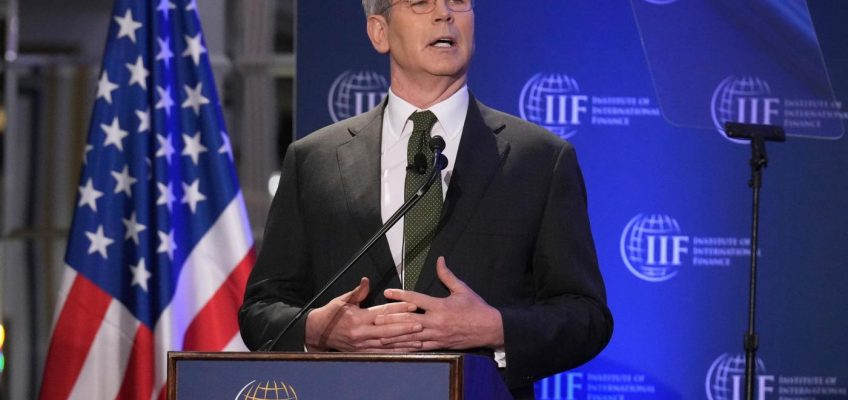By FATIMA HUSSEIN and CHRIS MEGERIAN
WASHINGTON (AP) — Treasury Secretary Scott Bessent leveled harsh criticism at the operations of the World Bank and the International Monetary Fund on Wednesday even as he tried to reassure nervous investors that the United States would maintain its global leadership role.
“America first does not mean America alone,” he said in a speech to the Institute of International Finance. “To the contrary, it is a call for deeper collaboration and mutual respect among trade partners.”
Although Bessent said the IMF and the World Bank are “falling short,” he stopped short of calling for the U.S. to withdraw from the institutions as some conservatives have advocated.
It was the latest example of how Bessent, a former hedge fund manager who keeps a close eye on the financial markets, has tried to calm the economic turmoil as President Donald Trump tries to rewire international trade through aggressive tariffs.
After Bessent’s remarks, reporters asked him about a Wall Street Journal article that said the huge U.S. tariffs that the Republican president has levied on China could be cut in half, citing unidentified people familiar with the matter.
Bessent said: “I’d be surprised if that discussion is happening.” However, he said he expects “there’d have to be a de-escalation” from Washington and Beijing’s trade confrontation.
Trump had said on Tuesday that the 145% tariffs on China could “come down substantially.” And then on Wednesday, he told reporters that “everybody wants to be a part of what we’re doing” and “everyone’s going to be happy.”
Bessent’s speech in Washington represented a broadside against the IMF and the World Bank, which provide loans and other financial support around the world.
He said the Trump administration “will leverage U.S. leadership and influence at these institutions and push them to accomplish their important mandates.”
Some of Bessent’s criticisms echoed the Trump administration’s efforts to root out progressive ideology from federal institutions. Bessent said the IMF “has suffered from mission creep” and “devotes disproportionate time and resources to work on climate change, gender and social issues.”
He said there were similar problems at the World Bank, which he said “should no longer expect blank checks for vapid, buzzword-centric marketing accompanied by half-hearted commitments to reform.”
Related Articles
The startup behind Shark Tank’s seaweed-based bacon
Tariff turmoil: How Tesla and other companies are dealing with the uncertainty of the trade war
Home buyers may face surprise credit hit from student loans
The world’s biggest companies have caused $28 trillion in climate damage, a new study estimates
EVs, tariffs in the spotlight as Chinese automakers take leading role at Shanghai auto show
One of the problems, Bessent said, is that China is still treated like a developing country, which gives it more favorable treatment from global institutions. With China as the second-largest economy in the world, he said, “it’s an adult economy.”
Despite growing friction between Beijing and Washington, Bessent said “there is an opportunity for a big deal here.”
Bessent wants the U.S. to boost manufacturing while China increases consumption, making its economy less reliant on flooding the globe with cheap exports.
“If they want to rebalance, let’s do it together,” he said. “This is an incredible opportunity.”
Beijing said Wednesday that “exerting pressure is not the right way to deal with China and simply will not work.”
Associated Press reporters Didi Tang and Michelle Price contributed to this report.


Leave a Reply